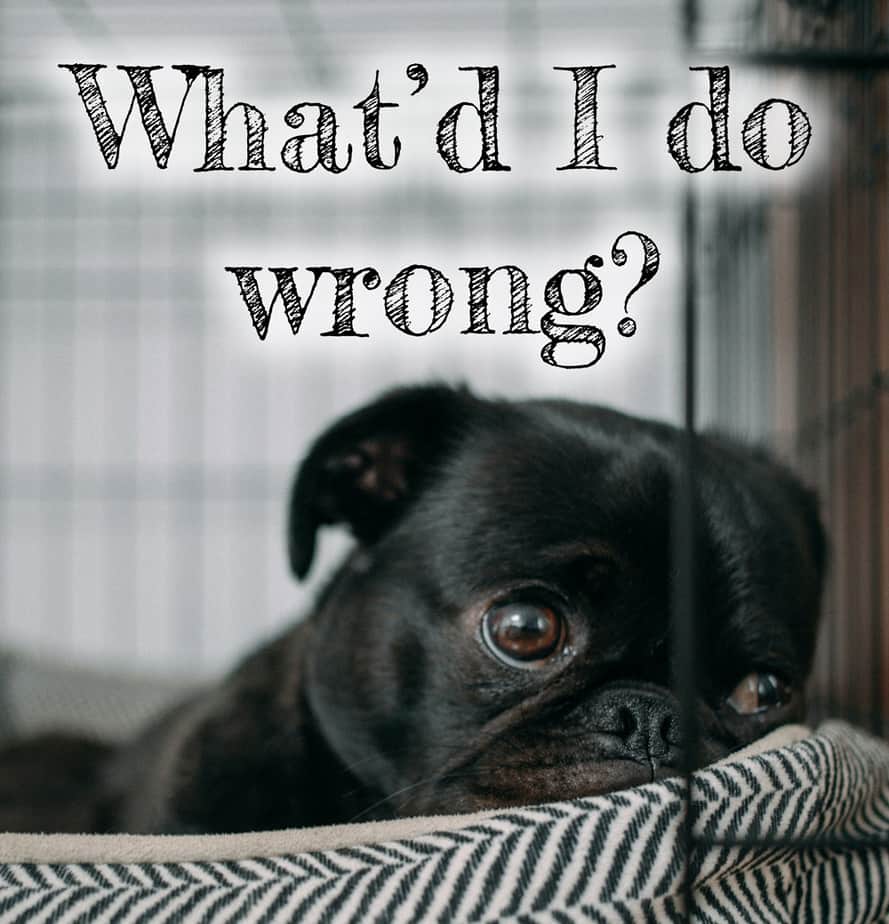As much as we all want bringing home our new puppy to be full of nothing but joy, there’s times where we might catch the puppy blues and have regrets about adding a puppy to our lives. You may even begin to resent or dare I say it, hate your puppy. So, will you ever love your puppy?
Let me ease your mind, these feelings are normal, and many puppy owners have them on occasion. However, you don’t have to feel stuck in the puppy blues! There are ways to remedy the situation when you feel like your puppy is making you depressed about getting one.

I Don’t Like My Puppy
There are a variety of reasons why you might be feeling like you don’t want your puppy anymore. Taking a moment to determine why you have these feelings of resentment towards your puppy can be an important first step in overcoming them.
In many cases, our expectations for our puppy play a huge role in developing and combating the puppy blues.
If you are looking for your puppy to fill a hole left by a former dog, or have expectations of an easy, best-ever dog, it’s easy to feel like they aren’t living up to your expectations.
Sometimes, just the large amount of work that goes into raising a puppy can lead to feelings of hating your puppy, especially if raising a puppy is new to you. Or you’ve had many years since your last puppy and forgotten how difficult it can be to raise a young dog.
Even if you’ve had puppies before and thought you were prepared, you also might find yourself more overwhelmed this time if you have a puppy that’s been particularly difficult to mesh with, given their individual and breed characteristics.
The important thing to remember, no matter the reason you find yourself regretting your decision to bring a puppy into your home, is that almost all puppy owners go through these stages of the puppy blues.
Staying positive, working out problems with a trainer, and being realistic with your expectations and goals can go a long way in combating these feelings.
On the other hand, it’s also important to remember that it’s OK to re-home a dog if you find that it’s truly not working out.
Responsible dog owners should have a goal to give their dog the best life possible. If you are realizing that the breed of dog you got doesn’t mesh well with your lifestyle, or that you aren’t prepared for the behavior problems that are occurring, you can fulfill that responsibility by seeking out another home that is a better fit.
While your goal should always be to set yourself (and your puppy) up for success by doing your research ahead of time, you can’t always predict how life will turn out.
Before we get into what you can do to improve your feelings towards your puppy, consider reading these two posts we’ve put together. They can be very helpful for puppy owners in managing unwanted behaviors, as well as improving your relationship with your puppy:
Here are some articles you might find helpful:
Exhausting Puppy: Are You Overwhelmed or Depressed?
7 Steps to Puppy Success: (A Complete Guide)
Calm Down Your Crazy Puppy: (A Complete Guide)

Ways to Get the Joy of a Puppy Back
The feeling of hating your puppy usually comes and goes, and feeling like that definitely won’t last forever.
We have several suggestions for ways to ensure your puppy doesn’t become a decision you regret, so you can learn to love having them in your life again.
One of the most important (and first) aspects to examine is your expectations for your puppy.
Puppy expectations
Keeping your expectations realistic is extremely important.
If you aren’t sure what realistic potty training and puppy behavior expectations should be, try talking with a local dog trainer or pet professional.
They have likely seen plenty of puppies in their career, and have a good understanding of what is normal for the average puppy.
Simply knowing that you are right on track with your puppy can be incredibly valuable and reassuring.
In fact, this is an important step to take at any point when you are worried about your puppy’s behavior.
If a trainer happens to determine that your puppy is lacking in one area of training or behavior, you’ll be able to develop a plan to move forward in the best way possible.
Several great places to start your search for an educated and ethical dog trainer include:
– The Certification Council for Professional Dog Trainers
– The Association of Professional Dog Trainers
– Karen Pryor Academy Certified Training Partners
– The Academy for Dog Trainers graduates
If you’ve determined that you are being realistic with your expectations of your puppy, and you’ve also made sure your puppy’s behavior is normal for their age and breed, there are several other options you can try.
Especially if there’s a certain aspect, such as potty training or household manners that are causing you extra stress. A professional can give you some easy guided steps to take the pressure off of you.
Here is a helpful article Geoff wrote about his feelings of regret he had with his puppy which you might find helpful: I regret getting a puppy
And if your puppy is your second dog, you might also like to read Was Getting a Second Dog a Mistake?
Strengthening your bond
Trying another activity that strengthens your bond with your puppy can be helpful as you work through training and behavior problems.
Sometimes this can be as simple as taking a hike on a long leash with nobody else around, or even just sitting on the floor for extra time every day to spend more time snuggling with your puppy, or playing their favorite game.
Spending time doing things you enjoy with your puppy can strengthen your bond and can lead to you loving them.
Other times, you might consider taking a class “just for fun” to focus on something other than obedience training for the moment.
While training is all tricks and games from the dog’s point of view, training obedience can be much more stressful on the human side of the equation.
Too often we feel like obedience is so necessary that training them actually becomes stressful.
Taking a class on tricks, or agility, or something that’s completely different will not only provide you a fun activity, but will likely help further your training in general, too!
If you cannot find fun classes local to you, there are several online options available as well. Fenzi Dog Sports Academy has a variety of classes throughout the year, and there are also a variety of good trick training videos available for free on YouTube and other online platforms.
Finally, there are a few good management options that can help you find joy in raising your puppy once again.

Managing your puppy
When your puppy is running around, biting, and being extra chaotic, it’s usually because they are tired and need a nap. It’s important to remember that puppies need a LOT of sleep – 20+ hours a day is fairly common.
Imagining your puppy as an overtired toddler when they’re being extra naughty can help.
Using a baby gate, an exercise pen, or a crate, can give your puppy a designated quiet area where they can get used to taking breaks.
Most puppies do not know how to self-regulate their excitement and sleep schedules and need some help from us.
Giving them something to do with their brain is important, too, so be sure to get them plenty of toys.
Toys that can be filled with food or treats, such as a Kong, are wonderful options when your puppy needs something to help calm them down.
Freezing them after stuffing them will make them last longer, and they’ll be soothing to any puppy that is teething, too!
Growing to love your puppy
No matter your reason for hating your puppy, it’s often relieving to know you are not alone.
Puppies are hard work, and this can lead to feelings of regret and a dislike of your puppy. But as they get older, they become easier, and the more time you spend with them, the greater your bond with them will grow.
Eventually, your puppy will grow into an old friend with lots of memories, and this will almost certainly grow a seed of love in your heart for them.
Recognizing why you are having thoughts of regret, along with identifying some options to add the joy of a puppy back into your life, can go a long way in getting over the puppy blues.
Reaching out to a professional when you are concerned, along with managing your expectations for puppy behavior, will also set you up for success and help prevent additional frustrations.
Setting boundaries and providing structure for your puppy will not only help you manage their behavior, but will help your puppy grow into a wonderful member of the family, too. If you find your puppy to be overbearing because of them being clingy you might want to read our post, Why Is My Dog So Clingy? (Revealed).
In addition, it’s important to remember to keep feelings of frustration away from your puppy.
While it might be tempting to yell or otherwise show your puppy just how upset you are with them, it doesn’t do anything to further your relationship or solve your problems.
A fearful puppy will become a bad behaved one, which will only exasperate things.
Instead, talking about those feelings with other puppy owners who can understand what you’re going through can help you get your feelings off your chest, without damaging your relationship with your puppy.




